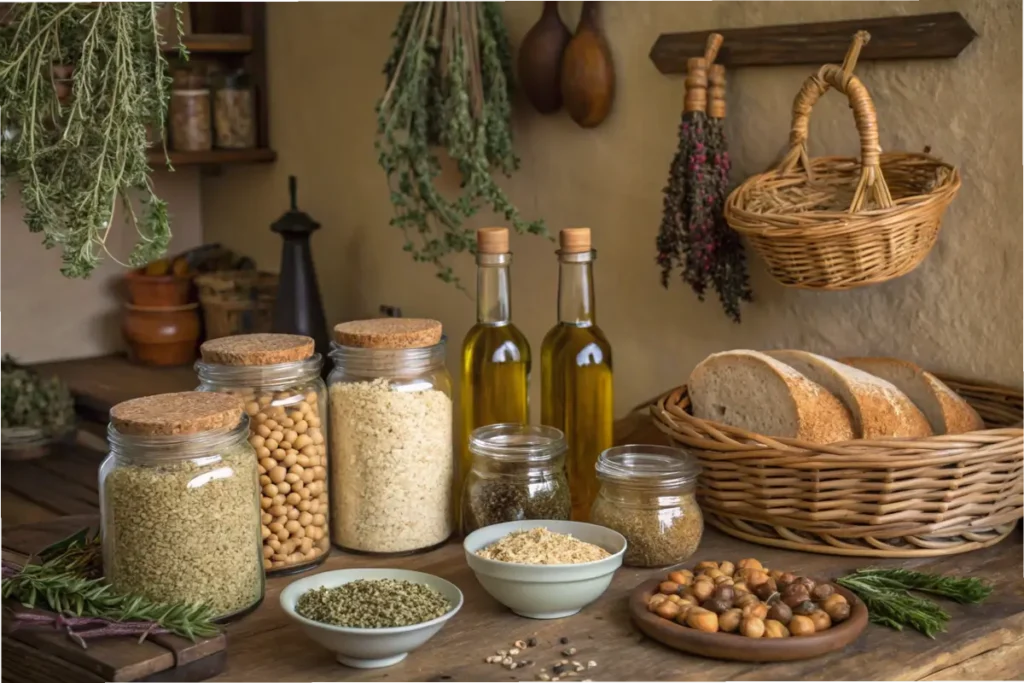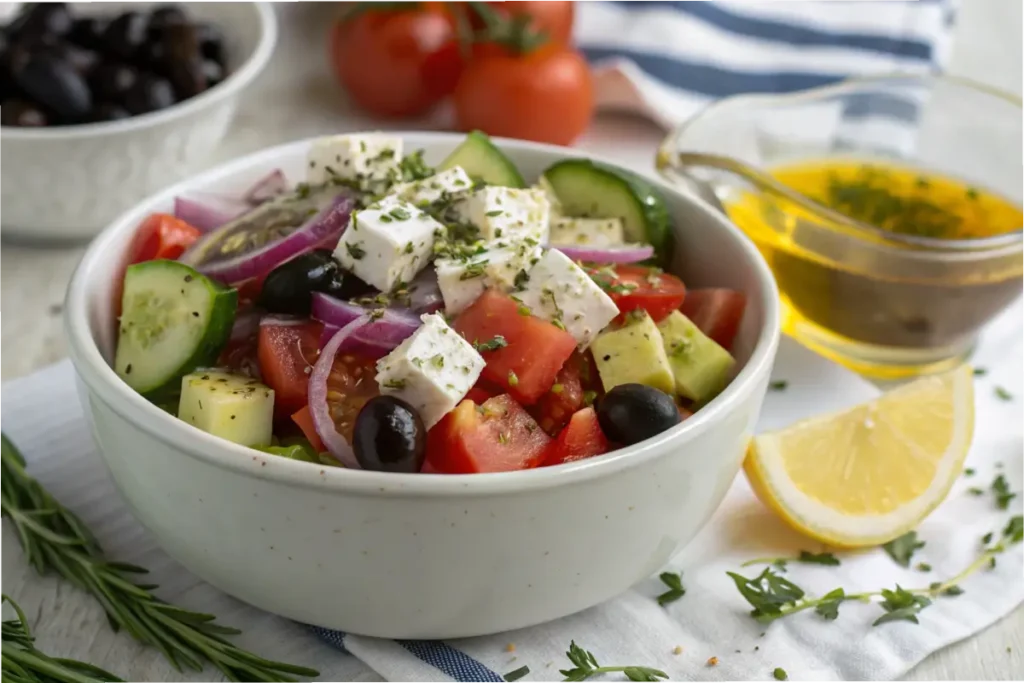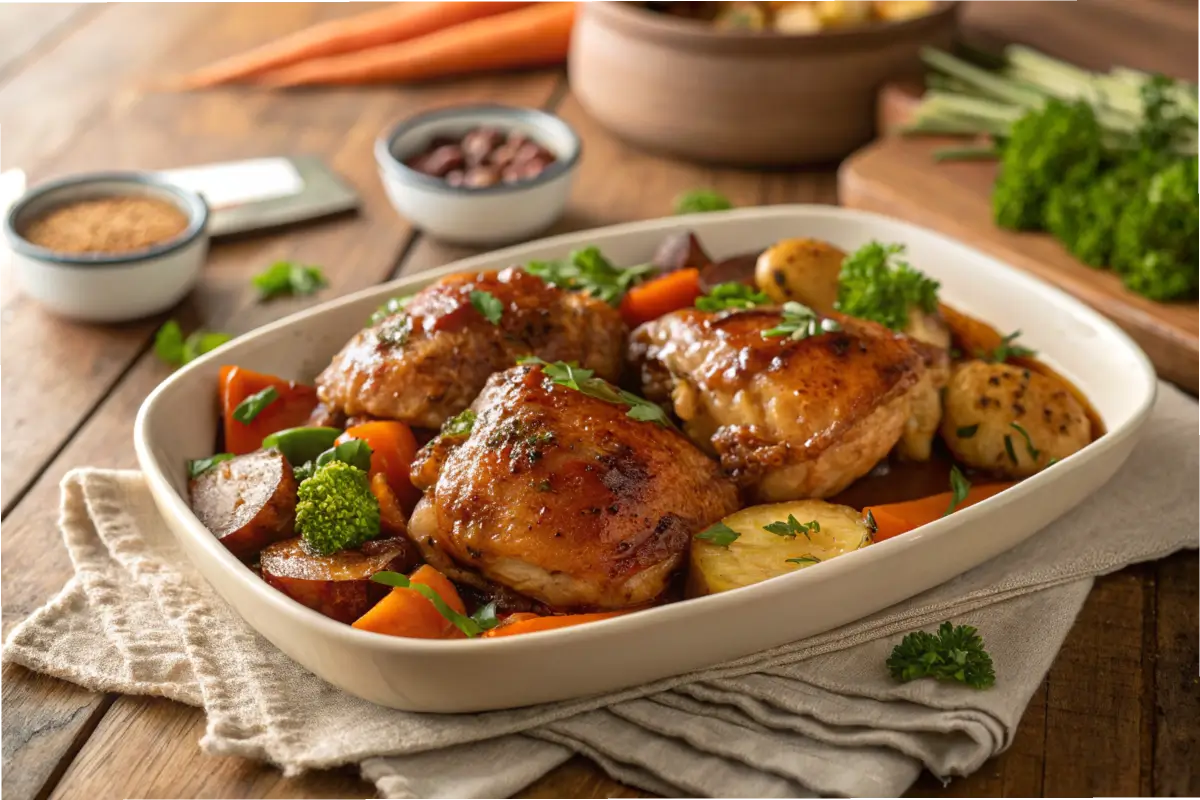Mediterranean cooking is a culinary celebration of vibrant flavors, fresh ingredients, and a healthy lifestyle. Rooted in the sunny climates of Southern Europe, the Middle East, and North Africa, it’s a cuisine rich in history and culture. From the golden drizzle of olive oil to the tangy burst of feta cheese, Mediterranean food offers an array of ingredients that are as nutritious as they are delicious. In this article, we’ll uncover what are the main ingredients of Mediterranean cooking and how they contribute to the region’s unique and wholesome dishes.
Introduction to Mediterranean Cuisine
What Defines Mediterranean Cooking?
Mediterranean cooking revolves around simplicity and freshness. It’s not just a diet but a way of life that emphasizes plant-based foods, lean proteins, and healthy fats. The cuisine thrives on seasonal produce, which ensures that every ingredient is at its peak flavor. Think of juicy tomatoes, crisp cucumbers, and aromatic herbs like oregano and rosemary. These ingredients, when combined with pantry staples like olive oil and grains, create dishes that are both hearty and nourishing.
The Cultural and Regional Diversity in Mediterranean Ingredients
The Mediterranean region spans multiple countries, each bringing its unique twist to the shared culinary tradition. In Greece, you’ll find dishes like moussaka rich with eggplant and béchamel sauce, while in Italy, olive oil and whole grains dominate. The Middle Eastern side embraces hummus, tahini, and pita bread. Despite these regional variations, the unifying factor is the reliance on simple, high-quality ingredients. These core elements not only define Mediterranean cooking but also make it universally appealing.
Key Ingredients in Mediterranean Cooking
Olive Oil: The Liquid Gold
When people ask, “What are the main ingredients of Mediterranean?”, olive oil undoubtedly tops the list. This versatile ingredient is the heart of Mediterranean cooking, offering a rich flavor profile and a wealth of health benefits. Extra virgin olive oil (EVOO) is particularly prized for its fruity aroma and high antioxidant content. Used for sautéing, drizzling, or as a base for dressings, olive oil is indispensable. Whether in a rustic Greek salad or a hearty Italian bruschetta, olive oil transforms simple dishes into culinary masterpieces.
Tomatoes: Fresh, Dried, and Sauced
Tomatoes bring the Mediterranean sun to every dish. Whether fresh in salads, concentrated in sauces, or sun-dried for an intense flavor punch, they’re a key player. Mediterranean staples like shakshuka, caprese salad, and marinara sauce showcase the versatility of this ingredient. The balance of acidity and sweetness in Mediterranean-grown tomatoes is unmatched, making them a beloved addition to this cuisine.
Herbs and Spices: Mediterranean Aromatics
The aroma of Mediterranean cuisine often starts with fresh and dried herbs. From the woody scent of rosemary to the sweet fragrance of basil, these herbs define the cuisine. Spices like nutmeg and fennel seeds add complexity, while bay leaves and oregano enhance soups, stews, and roasts. The Mediterranean pantry thrives on layers of flavor, with each herb or spice playing a vital role.
Legumes: The Protein-Rich Staples
Mediterranean cooking emphasizes legumes like chickpeas, lentils, and fava beans as affordable, nutritious sources of protein. Hummus, the classic chickpea dip, is an international favorite, while lentil soups and stews provide hearty meals. Legumes are also featured in salads, often tossed with fresh herbs, olive oil, and a squeeze of lemon for a refreshing bite.
Seafood: Fresh and Flavorful
Bordered by the Mediterranean Sea, this cuisine naturally highlights fresh seafood. Whether grilled, poached, or fried, fish like sardines, sea bass, and tuna are integral. Shellfish, octopus, and calamari are also celebrated. Dishes such as Spanish paella and Italian seafood pasta showcase the region’s maritime bounty.
Cheese: A Variety of Textures and Flavors
Cheese in Mediterranean cooking ranges from the crumbly saltiness of feta to the creamy decadence of ricotta. These cheeses are often paired with fresh vegetables, drizzled with olive oil, or served as standalone snacks. Feta-stuffed peppers and cheese-topped casseroles are classic examples.
Whole Grains: The Foundation of Many Dishes
From nutty farro to tender couscous, whole grains are the backbone of many Mediterranean meals. Tabbouleh, a salad of bulgur wheat and parsley, and pilafs with rice or orzo are examples of their importance. Whole grains not only add fiber but also soak up the flavors of olive oil, herbs, and spices.
Vegetables and Fruits in the Mediterranean Diet
Vegetables: A Rainbow of Flavors
Mediterranean cuisine puts vegetables front and center, not as side dishes but as stars of the meal. Staples include eggplant, zucchini, and artichokes, which are grilled, roasted, or incorporated into dishes like ratatouille. Spinach often finds its way into pies and casseroles, while cucumbers add crunch to salads. The diet’s emphasis on plant-based eating is a key to its global appeal and health benefits.
Fruits: From Fresh to Dried
Fruits serve both as a refreshing end to meals and as integral components of savory dishes. Fresh fruits like figs, oranges, and pomegranates provide natural sweetness and color. Meanwhile, dried fruits like dates, raisins, and apricots are common in stews and tagines, offering a balance of sweetness and acidity. These fruits are also popular as snacks, paired with nuts for an energy boost.
This content adheres to the SEO structure and maintains a conversational tone while integrating the keyword What are the main ingredients of Mediterranean? Let me know if you’re ready to continue with Part 4!
Mediterranean Pantry Essentials

Pantry Staples for Everyday Mediterranean Cooking
A well-stocked pantry is the secret to preparing authentic Mediterranean dishes. Some of the most essential ingredients include olives, capers, and sundried tomatoes. Olives, whether green or black, add a salty bite to salads and stews. Capers, with their tangy flavor, often complement fish dishes like baked sea bass. Vinegars, such as red wine vinegar and balsamic, are equally essential, lending acidity and depth to dressings and marinades. Don’t forget cooking wines, which enhance dishes like risottos and braised meats.
For a complete Mediterranean dinner, you’ll need high-quality extra virgin olive oil as a base for cooking or drizzling over finished dishes. Add a crusty loaf of bread, and you’re ready to experience the heart of the Mediterranean.
For more ideas on creating flavorful dishes, check out this Mediterranean Chicken Thighs recipe for inspiration.
Nuts and Seeds: Healthy Fats and Crunch
Nuts and seeds play a dual role in Mediterranean cooking, providing both texture and nutrition. Almonds, pistachios, and walnuts are commonly used in desserts, salads, and rice dishes. Tahini, a sesame seed paste, is the base for iconic dips like hummus and baba ganoush. Sesame seeds are sprinkled on bread or pastries for added crunch.
Including nuts and seeds in your meals is not only delicious but also promotes heart health. Their combination of healthy fats, protein, and fiber makes them an excellent pantry staple.
Health Benefits of Mediterranean Ingredients
Heart Health and Longevity
The Mediterranean diet has long been associated with reduced risks of heart disease and longer lifespans. Thanks to its reliance on olive oil, fresh vegetables, whole grains, and lean proteins like fish, the diet is rich in antioxidants, healthy fats, and essential nutrients. Studies consistently show that the Mediterranean lifestyle supports cardiovascular health by reducing bad cholesterol levels and inflammation.
Ingredients such as tomatoes and garlic provide powerful antioxidants, while omega-3 fatty acids in seafood help maintain healthy heart rhythms. This synergy of nutrient-rich foods explains why people living in Mediterranean regions often enjoy longer, healthier lives.
How the Ingredients Promote Balanced Nutrition
What sets Mediterranean ingredients apart is their balance. The combination of lean proteins, healthy fats, and complex carbs ensures sustained energy and overall well-being. For instance, legumes like chickpeas offer fiber and protein, while fruits and vegetables provide essential vitamins and minerals.
The versatility of these ingredients also makes it easier to maintain variety in meals, keeping them exciting and nutritionally diverse. Whether it’s a simple tomato-based pasta or a hearty lentil soup, each dish emphasizes balance and flavor.
For a creative twist on Mediterranean-inspired meals, explore how to incorporate fresh, whole ingredients into your cooking with this Mediterranean recipe collection.
Recipes to Highlight Mediterranean Ingredients

Easy Mediterranean Recipes to Try at Home
Cooking Mediterranean food at home doesn’t have to be complicated. Start with simple dishes that showcase what are the main ingredients of Mediterranean cooking. For example, a Greek salad combines crisp cucumbers, juicy tomatoes, salty feta, and a drizzle of olive oil for a refreshing and easy side dish. Another classic is hummus, made from creamy chickpeas, tahini, garlic, and lemon juice. Serve it with warm pita bread or fresh vegetables for dipping.
Looking for something heartier? Try shakshuka, a flavorful dish of eggs poached in a spicy tomato sauce with onions and peppers. Pair it with crusty bread to soak up the savory goodness. These recipes emphasize the versatility and simplicity of Mediterranean ingredients.
Tips for Using Mediterranean Ingredients in Fusion Cooking
Mediterranean ingredients are adaptable, making them perfect for fusion recipes. Add roasted vegetables like zucchini and eggplant to tacos for a Mediterranean-Mexican twist. Use herbs like oregano and basil in Asian-inspired noodle dishes for a fresh burst of flavor. Don’t be afraid to experiment—ingredients like olive oil, garlic, and grains pair beautifully with cuisines from around the world.
FAQs About Mediterranean Ingredients
What Is the Most Important Ingredient in Mediterranean Cooking?
It’s hard to narrow it down, but olive oil is often considered the backbone of Mediterranean cuisine. It’s used in nearly every dish, from salads to desserts, for its rich flavor and health benefits. Alongside olive oil, fresh produce like tomatoes, cucumbers, and herbs play a crucial role in defining the flavors of the region.
Can Mediterranean Ingredients Be Found Outside the Region?
Absolutely! Most Mediterranean staples, like olive oil, chickpeas, and spices, are widely available in grocery stores around the world. Specialty items, such as high-quality feta cheese or preserved lemons, can often be found in international markets or online.
Are All Mediterranean Ingredients Healthy?
While Mediterranean cuisine is renowned for its health benefits, not all ingredients are created equal. Some items, like cheeses or cured meats, should be enjoyed in moderation due to their salt or fat content. However, the overall emphasis on fresh, whole foods makes the diet one of the healthiest in the world.
For more recipe inspiration and cooking tips, consider exploring this Mediterranean recipe guide to elevate your meals.
The Cultural Significance of Mediterranean Ingredients
Mediterranean Ingredients: A Reflection of Regional Heritage
Mediterranean ingredients do more than just create delicious meals—they tell the story of a rich cultural heritage. From the golden olive groves of Greece to the vibrant spice markets of Morocco, these ingredients reflect the region’s diverse history and traditions. For example, olive oil, often referred to as liquid gold, has been a symbol of prosperity and health for centuries.
Traditional recipes, such as Italian bruschetta or Lebanese tabbouleh, highlight what are the main ingredients of Mediterranean cooking and their connection to local customs. Each dish is a celebration of community, often shared during family meals or festive gatherings.
How Seasonal Eating Shapes Mediterranean Cuisine
Seasonal eating is at the core of Mediterranean cooking. Ingredients like tomatoes, cucumbers, and zucchini are used at their peak freshness, ensuring that every dish bursts with natural flavor. This approach not only supports sustainable farming practices but also preserves the vibrant taste that Mediterranean cuisine is known for.
Modern Applications of Mediterranean Ingredients
Incorporating Mediterranean Staples into Modern Diets
In today’s world, what are the main ingredients of Mediterranean cooking, like olive oil, whole grains, and fresh vegetables, are being embraced in modern diets. People looking for a healthier lifestyle often turn to Mediterranean ingredients for their nutrient-rich profiles and versatility. For instance, quinoa, though not traditionally Mediterranean, is now paired with olive oil and herbs to create innovative salads.
Fusion dishes are also on the rise, blending Mediterranean elements with other cuisines. A prime example is Mediterranean sushi, where fish like tuna and herbs such as dill are rolled into rice and seaweed.
Why Mediterranean Ingredients Are Perfect for Meal Prepping
Another modern trend is meal prepping, and Mediterranean ingredients fit the bill perfectly. With their long shelf life and ease of preparation, items like legumes, grains, and roasted vegetables are ideal for make-ahead meals. Batch-cooked lentil soups or grain salads with fresh herbs ensure that eating healthy throughout the week is simple and flavorful.
Mediterranean cooking continues to inspire chefs and home cooks alike, proving that its timeless ingredients remain relevant. For innovative recipe ideas, explore this Mediterranean-inspired collection to bring the region’s flavors into your kitchen.
Conclusion
Mediterranean cooking is a vibrant tapestry of flavors, health benefits, and cultural heritage. The answer to what are the main ingredients of Mediterranean lies in the simplicity and quality of its staples: olive oil, fresh vegetables, whole grains, legumes, and aromatic herbs. These ingredients not only create dishes that are bursting with taste but also form the backbone of a lifestyle celebrated for its balance and longevity.
Beyond the table, Mediterranean cuisine represents a way of life that prioritizes seasonal eating, community, and mindfulness. From a refreshing Greek salad to a comforting bowl of lentil soup, every meal is an opportunity to savor the region’s rich history and vibrant culture.
Whether you’re incorporating these ingredients into traditional recipes or experimenting with modern fusion dishes, the Mediterranean diet offers endless possibilities. Its timeless appeal continues to inspire people around the world to embrace healthier, more flavorful eating habits.
Take the first step in your Mediterranean cooking journey by exploring recipes and experimenting with the versatile ingredients discussed in this article. For even more inspiration and ideas, visit Adviser Recipes and discover a variety of Mediterranean-inspired dishes to bring these classic flavors into your kitchen. Enjoy the simple, wholesome delights that Mediterranean cuisine has to offer!

